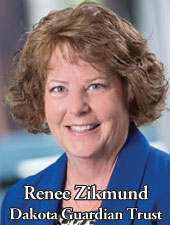While managing personal finances is something universal that we all deal with, it is also something that looks very different for each of us. As such, this is an area where we may benefit from professional experience and a healthy dose of objectivity. Overall, maximizing your hard-earned income, budgeting properly, making educated investments, managing risk, and planning ahead are the fundamental steps towards a future that’s financially stable.
 Clearly establishing your financial goals first will set the foundation for what your plan for the future will look like. “We understand that every individual has unique financial goals consisting both of short and long-term time frames,” emphasizes Lisa Karnatz of Nebraska Bank of Commerce. “Short-term goals may include a dream vacation or a new car while long-term goals may include purchasing a home, saving for college or owning a business. Our job at NBC is to make every dream a reality.
Clearly establishing your financial goals first will set the foundation for what your plan for the future will look like. “We understand that every individual has unique financial goals consisting both of short and long-term time frames,” emphasizes Lisa Karnatz of Nebraska Bank of Commerce. “Short-term goals may include a dream vacation or a new car while long-term goals may include purchasing a home, saving for college or owning a business. Our job at NBC is to make every dream a reality.
NBC offers a wide variety of products and services that help customers attain their financial goals. Two very popular savings products target youth and seniors by offering highly competitive rates. Online and mobile banking services enable customers to transact business 24 hours a day, 7 days a week and are free services of the bank. In the very near future, mobile deposit will enable customers to deposit checks at any time from any location.
Our employees are our greatest resource, partnering with customers to help them attain their financial goals. NBC personal bankers are able to offer a wide array of banking products including home equity lines of credit, personal and business checking and savings accounts, debit cards, and certificates of deposit. Above all, NBC personal bankers play a consultative role when helping customers make financial decisions. By thoroughly understanding customer needs, our personal bankers are able to recommend products and services that help customers reach their financial goals, whatever those goals may be. Personal bankers aim to build long-term relationships built on a foundation of trust. We want to partner with customers to create successful financial results.
In today’s fast paced world, we respect our customers’ time and strive to deliver fast and accurate results. We align our customers’ needs with customized products, services and advice and build trust by putting the customers’ needs first.”
 Properly managing and paying off debt is among the most common concerns with respect to personal finance. “Eliminating debt is a great short term financial goal to set, and establishing a budget is the first step in eliminating debt,” adds Jordan Moehlenhoff, a Business Banking Officer at West Gate Bank®. “Being able to account for every dollar in and out of your account is necessary to living within your means and achieving no debt.
Properly managing and paying off debt is among the most common concerns with respect to personal finance. “Eliminating debt is a great short term financial goal to set, and establishing a budget is the first step in eliminating debt,” adds Jordan Moehlenhoff, a Business Banking Officer at West Gate Bank®. “Being able to account for every dollar in and out of your account is necessary to living within your means and achieving no debt.
West Gate Bank® is extremely ‘hands-on’ when it comes to personal finances. We are a big bank with a small-town feel. At any of our seven locations, you will find that every one of our employees is not only willing, but extremely capable, of answering any questions that a customer might have. We make it really convenient to bank with us, and offer products that allow our customers to keep their personal finances in order. Any one of our bankers will take the time to sit down with a customer and listen to their financial goals. We can then put together a plan to help our customers achieve their goals and provide personal financial freedom.
We also have Free InstAlert at West Gate Bank®. InstAlerts notify you, through text message or email, of important account activity without having to login to online banking. These personalized account alerts can notify you anytime a debit card purchase has been made, when your balance drops below a certain threshold, and many other convenient notifications. This product is very beneficial for many busy professionals and people that struggle to find the time to keep up with their account.”
A simple principle to remember is that financial planning starts with a plan. First, you should take time to really understand your current financial situation by reviewing your income, assets and liabilities, evaluate your insurance coverage, your investment portfolio, your tax exposure and your estate plan. Once you have an understanding of what you truly have, then it’s easier to prioritize your financial and life goals and figure out how much time you may need to pursue your goals. Finally, implement strategies that address your financial weaknesses and build upon your strengths and don’t forget to review it every year. Some people like to choose a date each year to have a ‘State of the Finances’ meeting with their family, which can be quite rewarding and fun if you’ve made progress towards your goals.
While many aspects on the planning side depend so much on the individual, one piece of advice that applies to almost everyone is not to wait until you have a crisis to create a financial plan. The last thing most people want to worry about in a crisis is money, yet without a plan it very well could be the main thing you focus on, and you could really limit the options that you have by waiting.
For those just beginning the journey, have a goal to set a budget and stick to it. Make sure that you take care of the cornerstones of a good financial foundation — emergency savings equal to 3-6 months of income, eliminate debt, make sure that your life insurance, disability insurance and property and casualty insurance is sufficient and start saving for retirement.
For those further along, it’s important to have conversations with your children and your parents to find out how their financial plan is going to impact your plan. The last thing anyone who has been doing a good job saving wants is a surprise (most often in a crisis) that throws your financial plan out the window. Financial advisors can be helpful with facilitating those conversations that can be difficult, and sorting through the complexity of how each generation’s plans impact the others. Of course, if you haven’t started your own plan yet, it’s never too late and the same goals would apply – create an emergency savings account, pay down debt, save for retirement, and make sure that your insurance coverage is appropriate.
As you approach retirement, a goal should be to review your Social Security filing options – just because you can file early doesn’t mean you necessarily should. Review your asset allocation and make any necessary adjustments. It is a good idea to meet with a financial advisor about how you are going to spend your savings in retirement, and how you can mitigate the risks of outliving your money.
There are a number of reasons to consider working with a financial advisor. Developing a comprehensive financial plan can require knowledge and experience in several areas. What seems like a small financial decision today can have a big overall impact on your money in the future. A financial advisor can help you see the big picture, help you to identify opportunities, make recommendations based on your goals, and sometimes more importantly hold you accountable to your plan.
Bringing clarity to your long-term financial picture can seem like a significant challenge, even more so if you’ve never really taken the time to give it a thorough review. However, pursuing your investment goals does not have to be as daunting as it may appear. Not if you have a sound plan…and an experienced financial partner. A financial advisor will have direct access to experienced investment professionals, products and services.
 “When it comes to personal financial planning, it is critical to establish specific goals and stick to them,” explains Renee Zikmund, Vice President and Senior Trust Officer at Dakota Guardian Trust. “Of course, even the best financial plan may need to be revised in light of changing circumstances, and it is so important to inform your Trustee and Financial Advisor so that your plan can be updated accordingly. Furthermore, always remember to pay yourself first even when creating provisions for family members. Saving for your financial future is so very important and a habit you should start early in life. Even if the amount you save moves up and down during your lifetime, the fact that you are saving regularly is very important.
“When it comes to personal financial planning, it is critical to establish specific goals and stick to them,” explains Renee Zikmund, Vice President and Senior Trust Officer at Dakota Guardian Trust. “Of course, even the best financial plan may need to be revised in light of changing circumstances, and it is so important to inform your Trustee and Financial Advisor so that your plan can be updated accordingly. Furthermore, always remember to pay yourself first even when creating provisions for family members. Saving for your financial future is so very important and a habit you should start early in life. Even if the amount you save moves up and down during your lifetime, the fact that you are saving regularly is very important.
In addition to a lifetime financial plan, another critical component of safeguarding your assets and supporting your family’s financial security is a good estate plan. This should include a Health Care Power of Attorney, a Power of Attorney for Finances, a Will that directs who will receive your assets, and in some cases a Trust. Dakota Guardian Trust can serve as Power of Attorney for Finance and as personal representative in settling an estate along with serving as trustee. A corporate trustee such as Dakota Guardian can be very helpful in ensuring that all beneficiaries are treated fairly according to the terms of the will or trust, and that each person receives timely, consistent information during the estate settlement process. This may minimize concerns regarding fairness that sometimes arise when an individual or family member serves as trustee or personal representative. We want to know our clients well and be ready to step into our clients’ shoes to fulfill any of these roles. Spending time with a trust officer and sharing information about family dynamics can be very helpful.”
Renee further advises, “Some people may be nervous or overwhelmed to start down the path of estate planning. Often, there are specific triggering events that may naturally lead to estate planning, such as getting married, buying your first home or having a child, just to name a few. Keep in mind that your estate planning attorney will ask important questions about your financial and family goals to ensure your estate plan reflects your specific intentions.”
Your banker, accountant, financial advisor/planner, trustee and legal counsel are all valuable resources to consult on matters of personal finance. It is never too late (or early for that matter) to evaluate your current financial situation and develop a plan for moving forward. Establishing a relationship with a team of professionals can allow you to make informed decisions that can support your short-term and long-term goals.

